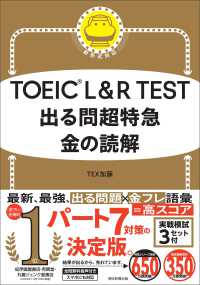Full Description
Inspiring teachers, changing lives. Successful teachers teach, and good leaders lead for the love of it. Despite difficulties, most of our schools are havens of joy and good learning. This book brings together a range of perspectives from influential school leaders and others immersed in education about what's important for children, for schools and us all - and why school leadership is fascinating and exciting as well as challenging.
Well Educated demonstrates a range of independent and lively thinking from engaging education leaders and thinkers. Contributors share their principles and experiences in providing a vision for schools to develop all young people intellectually, practically and socially. The chapters cover:
The purpose of education
What makes a quality curriculum
The role of examinations and assessment
Meeting the needs of your community
With case studies and reflective questions, this will be valuable reading for all school leaders and policy-makers who want to think beyond the reductive definitions of inspection judgements to develop schools rooted in an uplifting ethos and a love of learning.
Contents
Part 1: What is a good education? 1. The functionalist view of education. 2. Education as self-realisation. 3. Are all good schools alike? 4. Should schools serve individuals or communities? 5. Who decides what a good education is? Part 2: A good curriculum 6. The best that's been thought and said: the 'knowledge-rich' school. 7. Education for creativity. 8. Building up educated citizens. 9. Is a good school conceivable without great subject teaching? 10. Local curriculum development. 11. Education as transmitting knowledge, values and cultural identity. 12. Rendering tensions productive: Finding joy and seeking wisdom in the intellectual enterprise of the curriculum. 13. What is a quality curriculum? Part 3: Is assessment fit for purpose? 14. Assessment and children's experience of learning. 15. The role of public examination and qualifications. 16. The school leader as emancipator. 17. Understanding, embedding and assessing complex competences such as creative thinking, collaboration and communication. 18. How do we know someone is well educated? Part 4: Who benefits from education? 19. Creating joy. What does educational success look like? 20. Who are schools failing? 21. Education for families who don't see the point. 22. What is fairness in education? 23. The broader societal benefits of education 24. Is it possible to be overeducated? Part 5: What is an educated society? 25. Education as a means to foster a nation with a shared culture, tradition and values. 26. Is there an education utopia? 27. A vision for a better world? 28. A community of individual talents 29. Does society still value teachers? Afterword Index








